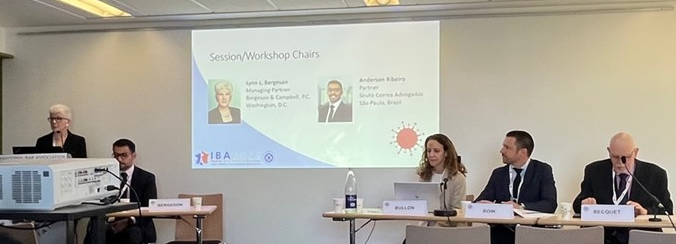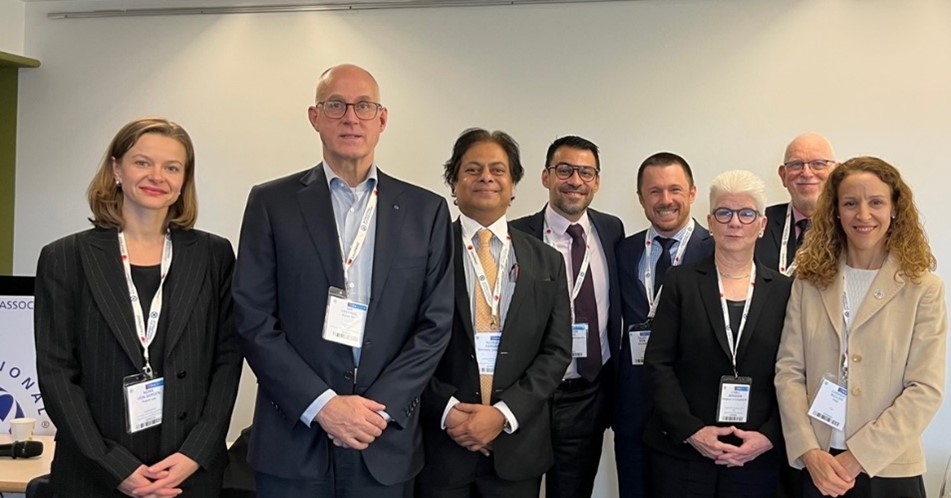About the Section
The Agriculture and Food Section (AFS), formerly the Agricultural Law Section (ALS) is a young and dynamic Section that focuses on the ever evolving and critically important intersection of agricultural and food law and policy. What could be more essential, more urgent, and more fascinating than the complex law and policy issues invited by the imperative to feed the planet, to do so equitably, and to do so effectively in a time of climate change and during/post a global pandemic? The AFS covers a comprehensive and emerging legal practice area, in particular relating to:
- Agriculture land usage
- Food production, distribution, and shortages
- Ownership and farmers’ rights
- Seed law, plant variety law, and biotechnology
- Food trade, food safety, and food liability
- Agri-tech
- Sustainable Agriculture—practices and investment strategies
- And much more!
Latest news
The Agriculture and Food Section (AFS) is pleased to be leading two sessions at IBA 2024, the International Bar Association’s (IBA) annual conference in Mexico City, September 15-20, 2024. Both sessions will further AFS’s mission to focus on the complex law and policy issues invited by the imperative to feed the planet, to do so equitably, and to do so effectively in a time of climate change and during/post a global pandemic.
Disruptive technologies in agriculture, Monday, 16 September (11:15 – 12:30 CST)
This session will explore the emerging technologies that are transforming agriculture, including artificial intelligence (AI), the Internet of things, agricultural drones, and precision agriculture, among other technologies. Speakers will discuss the implications of these technologies for increasing efficiency, productivity, and sustainability in agriculture, as opposed to the challenges and concerns related to data privacy, ethics, and regulation.
Session/Workshop Chair(s)
- Nusrat Hassan, Dentons, Mumbai, Maharashtra, India; Co-Chair, India Working Group
- Adeniji Oni, Niji Oni & Co, Lagos, Nigeria; Membership Officer, Agriculture and Food Section
Speakers
- Alvaro Carrau, Bado, Kuster, Zerbino & Rachetti, Montevideo, Uruguay; Co-Chair, Agriculture and Food Section
- Christian Lopez-Silva, SaúdeLaw, Mexico City, Mexico
Committees
- Agriculture and Food Section (Lead)
- Healthcare and Life Sciences Law Committee
- Technology Law Committee
Further information here
Foreign ownership of farmland, Tuesday, 17 September (11:15 – 12:30 CST)
This session intends to explore the impacts of the foreign ownership of farmland from an economic, social, and environmental perspective. Speakers will address the cross-border challenges faced in regulating and monitoring these transactions and the benefits and risks associated with foreign investment in farmland.
Session/Workshop Chair(s)
- Hon Oluseyi Adisa, Tunde & Adisa Legal Practitioners, Lagos, Nigeria; Secretary, Agriculture and Food Section (Moderator)
- Mykola Stetsenko, AVELLUM, Kyiv, Ukraine (Session chair/Keynote speaker)
Speakers
- Gloriana Salinas, ADM (Archer Daniels Midland), Mexico City, Mexico
- Patrick Sigl, Salt River Project, Phoenix, Arizona, USA
Committees
- Agriculture and Food Section (Lead)
- Healthcare and Life Sciences Law Committee
Further information here
Highlights from the 2023 IBA Annual Conference
The International Bar Association (IBA) Annual Conference took place in Paris from October 29 to November 3, 2023. During the Annual Conference, the Agriculture and Food Section (AFS) welcomed attendees to two sessions, as lead sponsor of “Antimicrobial resistance (AMR) regulation in the context of one health: how legislation can help reduce AMR” and as a co-sponsor of Biodiversity -- our life source, not just a resource: new legal instruments to protect and restore.”
On October 31, 2023, during “Antimicrobial resistance (AMR) regulation in the context of one health: how legislation can help reduce AMR”' panelists explored the legal and policy challenges of preventing the increase of AMR while feeding a growing world population and meeting global food security concerns. The speakers discussed viable solutions to addressing AMR, including the planned release of a Food and Agriculture Organization of the United Nations (FAO) toolkit, Quadripartite Legislative Assessment Tool for Antimicrobial Resistance, for addressing AMR globally. Lynn L. Bergeson, Managing Partner, Bergeson & Campbell, P.C. (B&C®) and Anderson Ribeiro, Partner, Souto Correa Advogados chaired the session, and Carmen Bullon, FAO Legal Advisor and an internationally recognized AMR expert; Philippe Becquet, Independent Expert Consultant, International Feed Industry Federation (IFIF), an agronomist specializing in animal nutrition; and Gilles Boin, Partner, Qolumn, with a specialization in French and European Products Law, presented.

Lynn L. Bergeson, AFS Chair; Anderson Riberio, Workshop Chair; Carmen Bullon, FAO; Gilles Boin, Qolumn; and Philippe Becquet, IFIF, introduce 'Antimicrobial resistance regulation in the context of one health: how legislation can help reduce AMR' at the IBA Annual Conference.

Nora Patricia Von Bergen, AFS Diversity and Inclusion Officer; Jan Holthuis, AFS Advisory Board Member; Nusrat Hassan, AFS Advisory Board Member; Anderson Riberio, Souto Correa Advogados; Gilles Boin, Qolumn; Lynn L. Bergeson, AFS Chair; Philippe Becquet, IFIF; and Carmen Bullon, FAO.
On November 2, 2023, during Biodiversity -- our life source, not just a resource: new legal instruments to protect and restore”, panelists spoke extensively on the best science about progressive extinction of species and how biodiversity can be protected amid economic drivers, lawsuits, and extractive industries. Professor Wilhelm Bergthaler, Haslinger / Nagele Rechtsanwälte GmbH; Chiara Colamonico, DLA Piper Italia; and Els Reynaers Kini, M V Kini Law Firm, chaired the session, and Juliette Bril, Fairway Avocats; Dörte Fouquet, Becker Büttner Held; Pooven Moodley, Natural Justice; and Dr. Pia Sethi, Centre for Ecology Development and Research, presented.
An overview of the 'Antimicrobial Resistance Regulation in the Context of One Health: How Legislation Can Help Reduce AMR' session, answers to submitted questions, and slides are available here.
Please contact the IBA Membership Office at www.ibanet.org/membership/joinTheIBA if you are interested in joining, or e-mail lbergeson@lawbc.com for more information about the AFS.
Watch session here
Webinars
Capacity Development Webinar for Lawyers on Responsible Land-Based Investments in Agriculture: Latin America Focus
Continuing last year’s successful series with the same title, focused on Africa and Asia-Pacific, the IBA AFS presents the latest capacity development webinar for lawyers on responsible land-based investments in agriculture, this time focusing on the Latin American region. A trailer is available below. To view the full webinar please email webinars@int-bar.org.
Watch Webinar
Capacity Development Webinar for Lawyers on Responsible Land-Based Investments in Agriculture: Africa and Asia Focus
Watch Africa focus
Watch Asia focus
The article discusses the CJUE ruling of 14 October 2021 in case C-186/18 on limitations on claims for infringement of an EU protected plant variety right. The crux of the ruling was a determination of the date of counting a three-year period after which claims become time-barred – specifically, in reference to ongoing infringements. The conclusions of CJUE are compared to those of the Polish Supreme Court in a ruling concerning limitations on claims for infringement of an EUTM in which a different view of the ongoing nature of certain infringements of IP is taken.
Released on
Jun 02, 2023
This article provides an overview of Brazilian law and regulation on genetically modified organisms (GMOs) and presents the most current legal discussions involving the use of GMOs in the food industry. The CTNBio and other surveillance authorities created a solid legal basis on biosafety for use of GMOs, however it is still a target of controversies by civil society and experts regarding risks to health and ethical issues.
Released on
Jun 02, 2023
Pakistan, as a member of the World Trade Organization (WTO) and a signatory to the Agreement on Trade-Related Aspects of Intellectual Property Rights (‘TRIPS Agreement’), is obligated to protect new plant varieties under article 27.3(b) of the TRIPS Agreement.
Released on
Apr 12, 2023
Although 38 per cent of the world’s population live within a narrow fringe of coastal land, it occupies only 7.6 per cent of the Earth’s total land surface (UN Environment Programme 2006). These populations largely depend on coastal resources for their livelihoods.
Released on
Jun 01, 2021
IBA Global Insight: AFS contributions
Food law: regulatory frameworks play catch up on cultivated meat products. In this news analysis, Jan Holthuis, Member of the IBA Agriculture and Food Section Section was interviewed about the situation in cultivated meat.
Cultivated meat is, according to Philip Lymbery, Chief Executive of animal welfare charity Compassion in World Farming, ‘humanity’s version of something that nature has already given us’. Noting that it’s produced in a bioreactor ‘from stem cells harmlessly drawn from donor animals’, Lymbery says lab-grown meat is therefore a ‘game-changer’ because it replicates nature ‘without the slaughter’.
Read the full article: Food law: regulatory frameworks play catch up on cultivated meat products
Diversity and Inclusion (D&I)
The Agriculture and Food Section is strongly committed to upholding and promoting Diversity and Inclusion for its members and activities. The Section advocates for the inclusion and empowerment of all and the elimination of discrimination on the basis of gender, age, culture, race, ethnicity, religion, disability, socioeconomic standing, gender identity or sexual orientation.
How to reduce bias?
- Everyone is subject to unconscious bias. Being aware of that makes you more likely to notice biased or stereotypical thought patterns when they arise;
- Question your first impressions, as they are a product of automatic thinking which is vulnerable to bias;
- Take an honest look at the types of people you resist, seek out and promote;
- Justify your decisions by writing down your reasoning and ensure you would be able to justify it to another person;
- Ask for feedback and involve people with different perspectives.
How to be more inclusive?
- Is there anyone in the team/group who might feel excluded right now? Can you help bridge gaps ? o Example: do you use everyone’s name equally? If not, are the names you do not use in the same way names that you find hard to pronounce so that you find other ways of addressing them?
- What have you been doing (or not doing) that might affect people with differences you can’t see?
- Introduce people in a way that gives tribute to their unique contributions and perspective;
- Make a genuine effort to get to know all the people you work with;
- Ask what would make it easier for people who are reluctant to speak up;
- Seek to learn from others.
Actions taken within the Section:
- Diversity and Inclusion training of the Section officers;
- Opening the officer meetings to all members of the Section for their active participation;
- Revision of the composition of officers in terms of Diversity;
- Ensuring a diverse mix of people for events and panel discussions.
Subcommittees and other groups
The Agriculture and Food Section also coordinates the activities of the following subcommittees/working groups.
- Agriculture and Food Section Advisory Board
Join us on LinkedIn
If you are a member of the Agriculture and Food Section, for additional networking opportunities, programs, interviews with fellow members and tips all exclusive to members, join our LinkedIn page at: https://www.linkedin.com/groups/12856078/.

